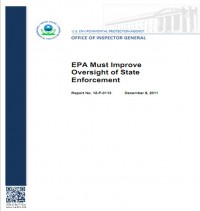By Lauren Goldberg, Staff Attorney—
Last month, the Environmental Protection Agency’s Office of Inspector General released an internal audit of EPA’s oversight of state enforcement of three environmental laws, including the Clean Water Act. In a year when presidential candidates and members of Congress shined the spotlight on EPA as a “job killing” agency, the audit is a stark reminder that EPA and the states are shirking their duty to protect human health and the environment. The Clean Water Act, which celebrates its 40th Anniversary in 2012, is the nation’s cornerstone law designed to protect healthy river systems and other waterbodies throughout the nation.The audit, bluntly titled EPA Must Improve Oversight of State Enforcement, reviewed the effectiveness of EPA’s oversight of states’ enforcement of three environmental laws: the Clean Water Act, Clean Air Act, and Resource Conservation and Recovery Act, which regulates hazardous waste. In the vast majority of states, the state—not EPA—acts as the first responder, implementing and enforcing these cornerstone public health and environmental laws when industry, cities, or others discharge pollution or fail to properly manage hazardous waste. EPA has backstop authority to take action and stop polluters from breaking the law but, as the audit points out, rarely exercises this authority.
The audit’s key findings include:
- EPA does not administer a consistent national enforcement program;
- State enforcement programs frequently do not meet national goals and states do not always take the necessary enforcement actions;
- EPA data indicate that noncompliance is high and the level of enforcement is low.
The report underscores our decade of experience exercising citizens’ right to enforce the Clean Water Act when EPA and the state refuse to act. Notably, the audit found that Oregon and Washington rank at the bottom for effective Clean Water Act enforcement programs. These findings are consistent with our experience reviewing polluters’ compliance with clean water laws—and the infrequent enforcement actions taken by the states and EPA. Riverkeeper works to enforce clean water laws, bringing dozens of industrial and municipal pollution dischargers into compliance with the law. In addition, we’re also working hard to fight for more funding for state agencies to take the necessary steps to curb pollution and protect water quality in the Columbia River.
In addition to the bad grade EPA gave itself, the audit begs the question: Why do Oregon and Washington rank near the bottom of all the states for pollution inspections and enforcement?
To read EPA’s audit, check out http://www.epa.gov/oig/reports/2012/20111209-12-P-0113.pdf
To learn more about Oregon’s response to its low ranking, read Scott Learn’s Oregonian article: http://www.oregonlive.com/environment/index.ssf/2011/12/oregon_lags_in_water_quality_r.html



